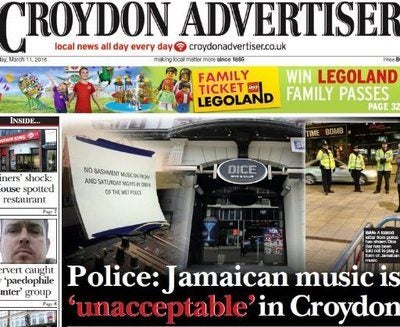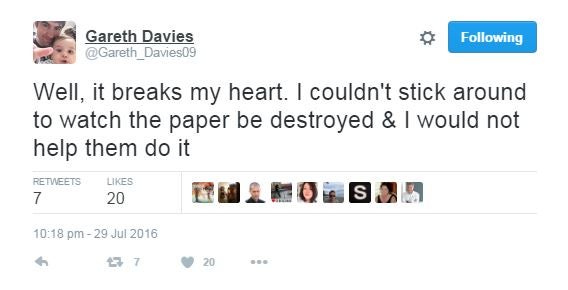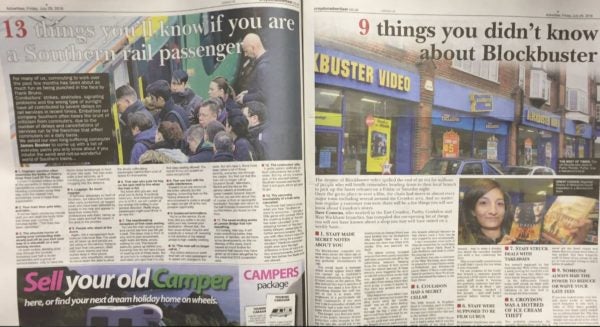
Trinity Mirror’s regional editorial director says he is “baffled” by claims made by former Croydon Advertiser chief reporter Gareth Davies that the paper has become a “thrown together collection of clickbait”.
Neil Benson hit back at Davies in a robust statement to Press Gazette (in full below) claiming the weekly title is “thriving” and a culture of “positivity and excitement about what the future has in store” had pervaded at the Advertiser following a newsroom restructure.
Davies, four-time Regional Press Awards Weekly Reporter of the Year, took to Twitter on Friday to express his “heartbreak” after claiming the newspaper’s “only role is to prop up the website with meagre advertising revenue”.

Davies started his career at the Advertiser, spending eight years on the paper before taking redundancy last month as a round of editorial cuts were made to Trinity Mirror titles in the south east, including the Advertiser.
An image shared by Davies showed a recent edition of the 147-year-old Advertiser with a spread of “listicles” including “13 things you will know if you are a Southern Rail passenger” and “9 things you didn’t know about Blockbuster”.

A spread in the latest edition of the Croydon Advertiser
Davies added: “Well, it breaks my heart. I couldn’t stick around to watch the paper be destroyed and I would not help them do it.”
In an apparent dig at the award-winning reporter, Benson said: “The days when reporters could choose, arrogantly, to write about what interests them, rather than what interests the audience, are over.”
He added: “Yes, editorial teams are smaller, budgets are tighter, spending has to be limited, resources have to be shared and we have to think carefully about which stories represent the best use of resources for our local audience.
“That isn’t always easy, but it’s where we are. We won’t apologise for operating a business in a prudent and professional way.”
Benson’s full statement to Press Gazette reads: “We are disappointed and baffled by Gareth’s Twitter outburst and do not recognise the claims he makes.
“The culture at the Croydon Advertiser, particularly since Gareth left and we introduced the new structure, has been one of positivity and excitement about what the future has in store and how the newspaper and website are evolving.
“In fact, the paper had its best week for some time just last week, with strong readership numbers across print and online.
“Everywhere it has been introduced, our digital first approach has accelerated audience growth enormously, while simultaneously producing more content for our print editors to choose from, leading to richer, more relevant papers.
“The Croydon Advertiser is thriving in the new structure and has had its best print performance for years, as we focus on covering the news and issues people want to read about.
“Online, news page views increased by 23 per cent in the first week of the new approach.
“The way the Croydon newsroom is now set up meant we could cover live the big story of the recent shooting in Surrey and were ahead of all other major news organisations. Some journalists are up for that change of pace; others are not.
“Unfortunately, newspapers’ circulations are in decline, as is the amount of money brands are prepared to spend on print advertising. That means our business model has to change the industry has to adapt or die.
“The idea that Trinity Mirror is hellbent on destroying the media industry is incomprehensible.
“As the UK’s largest publisher, nobody cares more about the success of the local media industry than Trinity Mirror and nobody has more of an interest in the local media industry succeeding than Trinity Mirror.
“The changes we make are about exactly that ensuring there is a future for our newsbrands. The only way we can do this is by building a strong, local and engaged audience.
“Yes, we are obsessed with audience, because without it we don’t exist. People don’t consume news the way they used to: it’s 2016 and the world is different, people are different and the channels and content available to them are different, so newsbrands also have to be different to compete.
“This means covering broader content on top of just news and sport. It means presenting content in different ways and it means embracing digital and new ways of doing journalism.
“For example, as any journalist with up-to-date skills knows, live blogging is an absolutely essential component in the digital mix. It plays a crucial role in establishing sites as a must-visit destination, engaging the audience, increasing dwell time and encouraging return visits.
“It’s fundamentally a different skill from writing for newspapers and has more in common with radio broadcasting than newspaper writing, so it works best with a more conversational tone.
“Marketleading publishers, including the BBC, Trinity Mirror and Guardian, follow this approach.
“Adapting to the world in 2016 also means having a newsroom with the right structure, tools and skills in place to deliver what is required. However all of this needs to be done against a backdrop of less money coming in than before.
“So, yes, editorial teams are smaller, budgets are tighter, spending has to be limited, resources have to be shared and we have to think carefully about which stories represent the best use of resources for our local audience.
“That isn’t always easy, but it’s where we are. We won’t apologise for operating a business in a prudent and professional way.
“We absolutely agree that local newspapers need to be a force for change and good that runs through our veins and by modernising and focusing on our audience, we can do an even better job of it.
“Journalists have to think like their audience, cover the questions and concerns they are likely to have and present stories in a way that makes them want to read it.
“The days when reporters could choose, arrogantly, to write about what interests them, rather than what interests the audience, are over.
“Newspapers are not funded by government or charity donations. As publishers the country and world over are realising, you have to make a profit to survive, and you have to have an audience of significant scale.
“Without an audience, there is no sustainable future.”
Email pged@pressgazette.co.uk to point out mistakes, provide story tips or send in a letter for publication on our "Letters Page" blog
